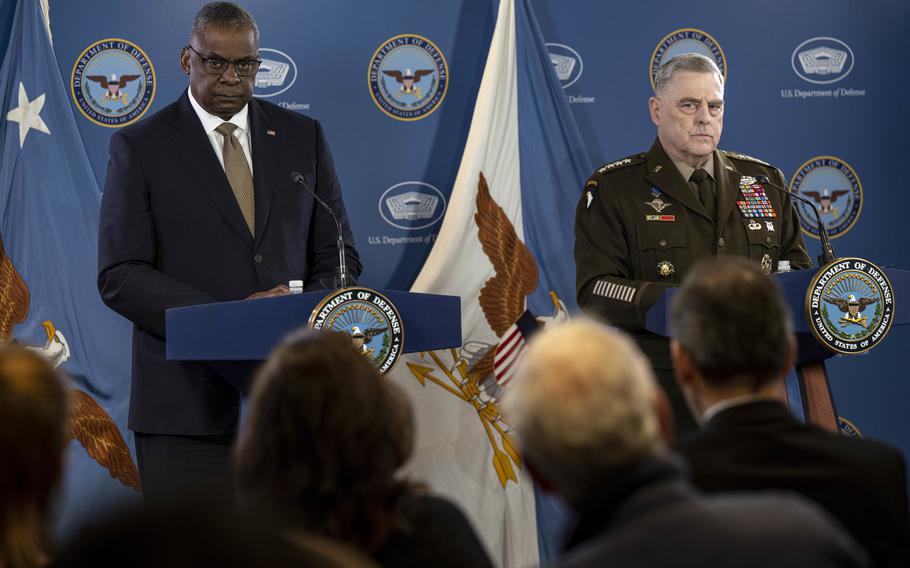
Secretary of Defense Lloyd Austin, left, accompanied by Chairman of the Joint Chiefs, Gen. Mark Milley, speaks during a briefing at the Pentagon in Washington, Wednesday, March 15, 2023. (Alexander Kubitza/Department of Defense)
WASHINGTON — The top two U.S. military leaders on Wednesday condemned the actions of a Russian jet that collided a day earlier with an American drone over the Black Sea, saying defense officials are working to declassify surveillance video that recorded the incident.
Defense Secretary Lloyd Austin called the encounter that involved two Russian jets “dangerous” and “reckless,” and Army Gen. Mark Milley, chairman of the Joint Chiefs of Staff, labeled the actions of the Russians as “unprofessional” and “unsafe.”
The U.S.-made MQ-9 Reaper drone crashed into the Black Sea on Tuesday after it had been harassed for nearly an hour by a pair of Russian Su-27 fighter jets, Pentagon officials said. After first dumping fuel on the drone, one of the Russian jets clipped a propeller on the unmanned aircraft, forcing U.S. officials to crash it into the water.
Austin said there is photographic evidence of the incident.
“We are still going through videos and photographs to ascertain what we can release,” he said. “In terms of what the video shows, we remain confident in the facts that we have conveyed thus far. And that will not change, in terms of what happened and how it happened.”
Pentagon officials have stressed the drone was conducting a routine surveillance operation over the Black Sea in international waters. Austin and Milley said Russia intentionally caused the confrontation, but they aren’t certain yet whether the pilots wanted to make physical contact with the drone.
“Was it intentional or not? We don’t know yet,” Milley told reporters at the Pentagon. “We know the intercept was intentional. We know the aggressive behavior was intentional.”
Austin said he spoke with Russian defense minister Sergei Shoigu on Wednesday about the ordeal and underscored U.S. aircraft will not be deterred from flying over international waters.
“It is incumbent upon Russia to operate its military aircraft in a safe and professional manner,” Austin said. “We take any potential for escalation very seriously, and that’s why I believe it’s important to keep the lines of communication [with Russia] open. That will help [avoid] miscalculation going forward.”
The Russian government has argued that the drone was flying in its airspace and made a sharp maneuver that caused it to crash.
The collision occurred over the Black Sea — a mostly landlocked body of water in southeastern Europe that’s bordered by Turkey to the south, Russia and Ukraine to the north, Romania, Bulgaria and Moldova to the west, and Georgia to the east. Turkey and Ukraine have the longest continuous coastline along the sea.
Pentagon officials have not yet said precisely where the MQ-9 drone, which had been in service for more than 15 years, went into the water or whether there will be an effort to recover it.
“There’s probably not a lot to recover, frankly,” Milley said, adding the U.S. military took measures to limit another country from gleaning intelligence from the drone. “Whatever was of value is no longer of value.”
Russia has already sent ships to the area and attempted to recover pieces of the drone, The Associated Press reported, citing unnamed officials.
The midair collision only added to diplomatic troubles between the United States and Russia, which had been decaying for years by the time Moscow launched a full-scale invasion of Ukraine in February 2022. Since then, the United States has given more than $30 billion worth of military weapons, equipment and other assistance to Ukraine.
Earlier Wednesday, Austin and Milley participated in the 10th meeting of the Ukraine Defense Contact Group — a collection of about 50 nations that gather when necessary to address what additional needs Ukraine might have in its defense against invading Russian forces.
Austin told reporters that multiple countries at the meeting pledged to contribute more needed equipment, including Slovenia, Sweden and Norway. Slovenia agreed to send armor, Sweden committed several Leopard battle tanks and Norway agreed to partner with the U.S. to send more ground-based, air-defense systems, he said.
“Russia is running out of capability and running out of friends,” Austin said, noting Moscow has had to rely on Iran and North Korea during the war and use World War II-era weapons. “[Russian President Vladimir] Putin still hopes he can wear down Ukraine and wait us out. So we can’t let up, and we won’t.”
Less than a month ago, on the day before the war’s one-year anniversary, the United States agreed to send another $2 billion in weapons and equipment. At the time, Austin reinforced the U.S. commitment to defending Ukraine “for the long haul.”
Though the United States has continued to help defend Ukraine, Washington has been careful to avoid anything that could be considered direct conflict with Russia. Milley on Wednesday would not say whether the Russian jet’s collision with the American drone constituted an act of war.
“I’m not going to go there,” he said. “Incidents happen and clearly we do not seek armed conflict with Russia.”